|
|
|
Sort Order |
|
|
|
Items / Page
|
|
|
|
|
|
|
| Srl | Item |
| 1 |
ID:
133811
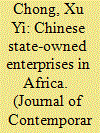

|
|
|
|
|
| Publication |
2014.
|
| Summary/Abstract |
The role of Chinese state-owned enterprises (SOEs) in Africa is puzzling: they pioneered China's inroads into Africa and shouldered the responsibilities of building and expanding cooperation with African countries, while these very activities and engagement, according to many scholars, often contradict or even undermine the political and diplomatic objectives adopted by the central government. To understand this puzzle, this article unpacks China's engagement in Africa, by examining large central SOEs in the resources and infrastructure sectors. It concludes that the commitment of large SOEs in Africa relies on small public and private contractors. The paradox therefore is, that while the central government encourages and supports the large SOEs to 'go global', it has limited capacity to control and regulate the small contractors.
|
|
|
|
|
|
|
|
|
|
|
|
|
|
|
|
| 2 |
ID:
133814
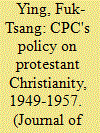

|
|
|
|
|
| Publication |
2014.
|
| Summary/Abstract |
After the establishment of the People's Republic of China (PRC) in 1949, the state-church relationship in China entered a new phase. This article, which is substantially based on party reports and archival documents, attempts to reconstruct and assess the party-state's policy on Protestant Christianity from 1949 until the eve of the Anti-Rightist Movement in 1957. The focus is not on the repeated dichotomy between 'state' and 'religion' but explores multiplicity and interaction as two possible aspects of the church-state relationship. The article investigates the following questions: what were the factors influencing the formation and development of the Communist Party of China's (CPC) policy on Protestant Christianity after the establishment of the PRC? Were there multiple actors within the party-state and Protestant Christianity? What kinds of relationships existed between the party-state and Protestant Christianity? Particular attention is given to how the CPC chose between 'struggle' (douzheng) and 'unity' (tuanjie) when dealing with Protestant Christianity under ideological constraints and complex political situations.
|
|
|
|
|
|
|
|
|
|
|
|
|
|
|
|
| 3 |
ID:
133810
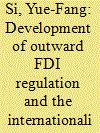

|
|
|
|
|
| Publication |
2014.
|
| Summary/Abstract |
The Investment Development Path (IDP) model has been widely accepted for illustrating the relationship between the inward and outward foreign direct investment (FDI) positions of a country and its economic status based on the data from developed economies. In recent years, however, outward FDI from developing economies has increased dramatically and it has been argued that institutions are 'forefront' factors in addition to the economic index. In this article, we use statistical data from China, which has gone through dramatic regulation reform and FDI development, to test the validity of the IDP model. We also trace the history of Chinese FDI regulation development to answer the following question: in what way are regulations important for FDI in different periods? We use Lenovo as a case study to show how a Chinese firm 'avoids' and 'adapts to' regulation changes. We find that the FDI development of China still follows the IDP model; however, the Chinese government has accelerated the whole process through active regulation reform. In a transition economy such as China, FDI co-evolves with the regulation, and the firms which can influence or foresee the policy changes can prosper considerably.
|
|
|
|
|
|
|
|
|
|
|
|
|
|
|
|
| 4 |
ID:
133816
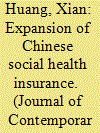

|
|
|
|
|
| Publication |
2014.
|
| Summary/Abstract |
This article asks 'who gets what, when and how' from China's recent social welfare expansion. Little research to date examines the overall landscape of China's social health insurance, which has changed dramatically since 2003, and the distributive consequences and implications thereof. Drawing on public survey data and fieldwork for empirical support, this article finds that China's recent social health insurance expansion does significantly expand people's access to social health insurance. However, the expansion, which entails health insurance fragmentation and increasing benefit disparities, not only reinforces existing social cleavages such as the rural-urban divide, but it also generates new divisions within urbanites and workforce. Moreover, multiple social cleavages that cross-cut class differences have been institutionalized into China's social health insurance system. This reflects authoritarian regimes' 'divide and rule' tactic in social welfare provision.
|
|
|
|
|
|
|
|
|
|
|
|
|
|
|
|
| 5 |
ID:
133809
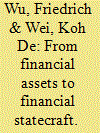

|
|
|
|
|
| Publication |
2014.
|
| Summary/Abstract |
Over the past few decades, China has accumulated over US$3.4 trillion of official foreign exchange reserves as it rises to become a global power. Do China's financial assets increase its ability to pursue its national interests internationally? With the globalisation and rising influence of Chinese state-owned enterprises, state-owned banks and sovereign wealth fund, as well as China's growing clout in several regional groupings, it is clear that China does possess the necessary mechanisms to assert its financial power. This article examines the efficacy and limitations of these mechanisms in Africa and Latin America, in the economic and political domains. In the economic domain, China has consistently used foreign oil contracts and acquisitions to secure direct oil flow from developing nations. An analysis of recent cases shows that while China is able to successfully harness its financial power in its pursuit of oil, it needs to fulfil its promises to the satisfaction of the recipient countries in order to maintain the value of its offers. In the political domain, China has used its financial assets to purchase diplomatic allegiance from various African and Latin American countries in support of its One-China policy. Studying both successful and unsuccessful cases reveals that while China is generally able to use its financial power in third-world countries against Taiwan successfully, its national goals have, in recent years, shifted to the economic realm, even with countries that still recognise the Taipei government.
|
|
|
|
|
|
|
|
|
|
|
|
|
|
|
|
| 6 |
ID:
133817
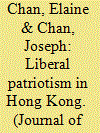

|
|
|
|
|
| Publication |
2014.
|
| Summary/Abstract |
Since Hong Kong's reunification with the People's Republic of China in 1997, debates about patriotism have erupted from time to time in Hong Kong. Considering Hong Kong's socio-political background, the feelings and attachment of Hongkongers towards their motherland are unsurprisingly complex. We therefore need a multidimensional concept to capture the complexities of Hong Kong patriotism. Based on survey data, we propose that the term 'liberal patriotism' best describes the type of patriotism in Hong Kong society, which is that love of the homeland and the state are qualified by liberal democratic values.
|
|
|
|
|
|
|
|
|
|
|
|
|
|
|
|
| 7 |
ID:
133818
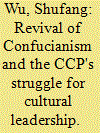

|
|
|
|
|
| Publication |
2014.
|
| Summary/Abstract |
The revival of Confucianism in the first decade of the twenty-first century is a political phenomenon that cannot be ignored with regard to its social influence and the particular meaning it has brought to China. However, so far, there has not been much academic research into the political reasons for this revival at a deeper level. Based on the 228 articles published in the People's Daily in the years between 2000 and 2009, a content analysis is conducted on how Confucianism was represented in this authoritative official medium. The examination of the role that Confucianism plays in the construction of the socialist 'advanced culture' provides a clear lens to observe the role of Confucianism in the Chinese political ideology, which is still rooted and based on Marxism-Leninism. This research is aimed at clarifying how Confucianism was pragmatically promoted by the government of the Chinese Communist Party (CCP) with the purpose of securing its cultural leadership. This state-led promotion reveals the vulnerability of the political status of Confucianism in contemporary China and its unsecured future.
|
|
|
|
|
|
|
|
|
|
|
|
|
|
|
|
| 8 |
ID:
133815
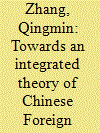

|
|
|
|
|
| Publication |
2014.
|
| Summary/Abstract |
This article tries to integrate the theories of personality type and Chinese foreign policy studies. It finds that theories of personality offer a new perspective on the study of Chinese foreign policy and help to better explain the differences in China's foreign policy under Mao Zedong and Deng Xiaoping, including their international orientation, the main themes of China's foreign policy during their respective times in office, their policies towards the major powers, as well as those towards small countries. Theoretically, such integration contributes to the development of a more general theory of foreign policy analysis that would travel better beyond the borders of the American case. Empirically it highlights the necessity and benefit of an integrated approach bringing leadership personality back into the center of the analysis while taking into account other levels of analysis in the study of Chinese foreign policy.
|
|
|
|
|
|
|
|
|
|
|
|
|
|
|
|
| 9 |
ID:
133813
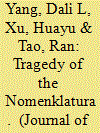

|
|
|
|
|
| Publication |
2014.
|
| Summary/Abstract |
We review James Kung and Shuo Chen's study, published in the American Political Science Review, on the causes of China's Great Leap Famine (1959-1961). Kung and Chen explain the variations in provincial leaders' radicalism on the basis of the career incentives facing the provincial First Secretaries. In this article, we question the validity of their basic assumptions and also uncover serious issues with the Kung and Chen dataset. We conclude that their empirical findings were based on faulty foundations. Our alternative hypothesis instead explains the dynamics of political radicalism during the Great Leap Forward in terms of the provincial leaders' political loyalty to Mao. Our findings point to the significance of political networks in influencing the behavior of elites and, by extension, political and socio-economic outcomes.
|
|
|
|
|
|
|
|
|
|
|
|
|
|
|
|
| 10 |
ID:
133812


|
|
|
|
|
| Publication |
2014.
|
| Summary/Abstract |
To win the hearts and minds of the Chinese people, Chinese Communist leaders launched a series of educational reforms to instill new socialist ideas and nationalistic fervor in kindergarteners immediately after the founding of the People's Republic of China in 1949. Under the strong influence of Soviet advisers and through a number of methods (games, singing, storytelling, site visits), Chinese kindergarteners were taught the nobility of labor, the sacrifice of soldiers, the grandeur of Tiananmen Square, the wise leadership of Chairman Mao Zedong, and the evilness of enemies. However, contrary to the conventional view, this article argues that Chinese education officials and kindergarten teachers never blindly followed Soviet educational models. They appropriated Moscow's techniques to suit their domestic needs, which included promoting nationalist feelings among children to consolidate the Chinese Communist Party's legitimacy and power. Ultimately, Chinese kindergarteners were turned into Party loyalists, not admirers of a foreign socialist model. Although the Party encountered difficulties in recruiting reliable teachers to implement its policies, it was able to impose nearly total control from above over the political content of kindergarten education. Under the one-party system, Chinese children were only taught what the Communist leaders wanted them to learn.
|
|
|
|
|
|
|
|
|
|
|
|
|
|
|
|
|
|
|
|
|